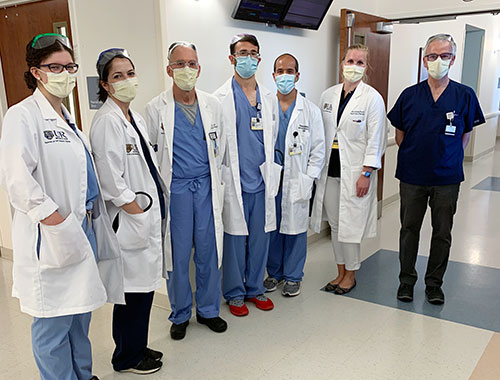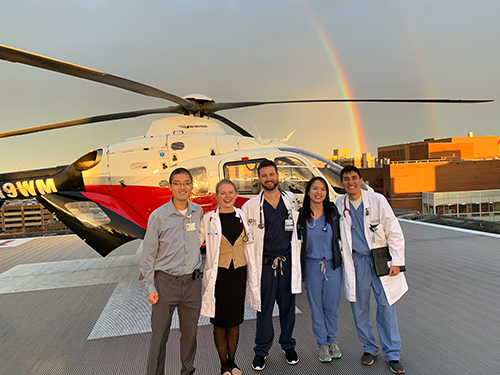Inpatient Rotations
 General Medicine Teaching Service - Strong Memorial (SMH)
General Medicine Teaching Service - Strong Memorial (SMH)
Resident teams include one upper level resident (PGY2 or PGY3) and two PGY1's. Teams are capped at 16 patients so PGY1's never care primarily for more than 8 patients. At the beginning of the year interns are capped at 7 patients to allow them some time to gain experience and efficiency before having a cap of 8.
Each team is supervised by a full-time General Medicine Hospitalist who is the attending of record for their patients. Daily attending rounds are described on the Teaching Rounds page. Patients on the service have a wide and representative array of inpatient medical problems and are drawn from a socioeconomically and ethnically diverse population. There is no overnight call since the service is covered by a night float team.
General Medicine Teaching Service - Highland Hospital (HH)
Resident teams include one upper level resident (PGY2 or PGY3) and one PGY1. Teams are capped at 10 patients. One team is paired with a geriatric attending caring for predominantly geriatric patients, while the other two teams have patients attended by hospitalists and community-based physicians. A variety of teaching sessions are held throughout the week as described on the Teaching Rounds page. Patients are covered by a night float team at night.
Hematology-Oncology Teaching Service - SMH
One PGY2 and two PGY1 are assigned to this service. They round daily with the leukemia-lymphoma service attending. Total resident census is capped at 15 patients with the remaining patients cared for by Nurse Practitioners.
 Critical Care - MICU and CCU - SMH
Critical Care - MICU and CCU - SMH
Three upper level residents and 4-5 PGY1's are assigned to the MICU at all times. The overnight coverage team for the MICU consists of a PGY1, a PGY2, and a Critical Care fellow. The CCU daytime team has 2 PGY1s and a PGY2. A PGY3, working with a Cardiology fellow, provides overnight coverage of the CCU. Both the MICU and CCU teams are integrated with Advanced Practice Providers (NPs and PAs), who work seamlessly with the residents to keep patient workloads at manageable levels. Supervision and teaching are provided by attending physicians who are board certified in Pulmonary-Critical Care (MICU) and/or Cardiology (CCU).
Emergency Medicine
All PGY1 and PGY3 residents rotate through the Emergency Department at Strong Memorial Hospital. Strong's ED is the largest in the region and a Level 1 Trauma Center.
Under the supervision of Emergency Medicine faculty members, medical residents evaluate and initiate management for adult patients with a wide variety of urgent and emergent issues ranging from sprains and strains to acute myocardial infarction, respiratory failure, and shock.
Neurology
Categorical and preliminary PGY1's have 2 weeks of inpatient consult experience on the Neurology inpatient consultation service at either SMH or HH. Supervision and teaching are provided by Neurology faculty members and Neurology residents. Neurology interns spend time on the neurology inpatient service in place of the consult experience and some of their general medicine service rotations.
Geriatrics and Palliative Care
Geriatrics and Palliative Care are areas of special strength and excellence at the University of Rochester and for our residency program.
Geriatrics Experiences
PGY1
Each categorical and preliminary intern spends a two-week rotation working with a Geriatrician in his or her primary care geriatrics practice and seeing elderly patients in a variety of community-based settings and programs.
PGY2
Each PGY2 resident rotates onto our Geriatric Fracture Center consult service at Highland Hospital on the Acute Care for Elders Unit. The R2 will also gain exposure to the skilled nursing facility rehabilitation services in one our affiliated facilities during this rotation. .
Palliative Care Experiences
Strong Memorial Hospital (SMH)
All second-year residents spend 2 weeks on the Palliative Care Service at SMH. Supervised by Palliative Care faculty and working side by side with experienced Palliative Care Nurse Practitioners and Palliative Care Fellows, residents perform Palliative Care consults on patients throughout the hospital and also participate in the primary inpatient care of patients on our state-of-the-art Palliative Care Unit. This required rotation, the first of its kind in the country, is one of our highest rated rotations every year.
 This program provides residents the opportunity to use what we learned in medical school, with the support of our Attending Physician, and senior residents. Our 'X+ Y' schedule allows us to gain experience in both an inpatient and outpatient setting. While working in the outpatient clinic, we build continuity and lasting relationships with our patients. The inpatient experience allows us to fully immerse ourselves in academic hospital medicine taking care of complex patients with urgent medical needs."
This program provides residents the opportunity to use what we learned in medical school, with the support of our Attending Physician, and senior residents. Our 'X+ Y' schedule allows us to gain experience in both an inpatient and outpatient setting. While working in the outpatient clinic, we build continuity and lasting relationships with our patients. The inpatient experience allows us to fully immerse ourselves in academic hospital medicine taking care of complex patients with urgent medical needs."
Shifan Li, MD
Class of 2023